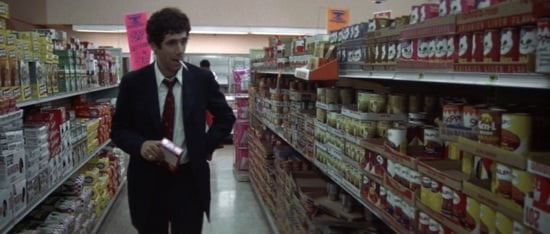Shocking Blocking (30)
By:
May 10, 2012

Robert Altman’s 1973 adaptation of Raymond Chandler’s The Long Goodbye was criticized, at the time, as an ironic put-down of classic private-eye movies. Instead, it is a long goodbye to the Sixties (1964–1973), the last era during which intellectuals believed that social control is exercised through anything so palpable as class domination. In the scene shown here, Altman’s avatar of Philip Marlowe (Elliott Gould) wanders the aisles of a supermarket at night muttering to himself. The garish ranks of cat- and dog-food cans are late capitalism’s invisible-prison bars; Marlowe is more imprisoned, in this scene, than he is when he goes to jail the following day. Although the only antidote to such Baudelairean spleen is volupté, i.e., the boundless freedom of which we catch a glimpse when at the beach, Altman’s Marlowe is a creature of the night and the city, a scuttling cockroach (think of all those shots in which he peers fretfully into the California sun from a darkened room). Via this conceit, Altman is entirely faithful to classic private-eye movies.
An occasional series analyzing some of the author’s favorite moments in the positioning or movement of actors in a movie.
THIRTIES (1934–1943): It Happened One Night (1934) | The Man Who Knew Too Much (1934) | The Guv’nor (1935) | The 39 Steps (1935) | Young and Innocent (1937) | The Lady Vanishes (1938) | Mr. Smith Goes to Washington (1939) | The Big Sleep (1939) | The Little Princess (1939) | Gone With the Wind (1939) | His Girl Friday (1940)
FORTIES (1944–1953): The Diary of a Chambermaid (1946) | The Asphalt Jungle (1950) | The African Queen (1951)
FIFTIES (1954–1963): A Bucket of Blood (1959) | Beach Party (1963)
SIXTIES (1964–1973): For Those Who Think Young (1964) | Thunderball (1965) | Clambake (1967) | Bonnie and Clyde (1967) | Madigan (1968) | Wild in the Streets (1968) | Barbarella (1968) | Harold and Maude (1971) | The Mack (1973) | The Long Goodbye (1973)
SEVENTIES (1974–1983): Les Valseuses (1974) | Eraserhead (1976) | The Bad News Bears (1976) | Breaking Away (1979) | Rock’n’Roll High School (1979) | Escape from Alcatraz (1979) | Apocalypse Now (1979) | Caddyshack (1980) | Stripes (1981) | Blade Runner (1982) | Tender Mercies (1983) | Monty Python’s The Meaning of Life (1983)
EIGHTIES (1984–1993): Repo Man (1984) | Buckaroo Banzai (1984) | Raising Arizona (1987) | RoboCop (1987) | Goodfellas (1990) | Candyman (1992) | Dazed and Confused (1993) |
NINETIES (1994–2003): Pulp Fiction (1994) | The Fifth Element (1997)
OUGHTS (2004–13): Nacho Libre (2006) | District 9 (2009)
Joshua Glenn’s books include UNBORED: THE ESSENTIAL FIELD GUIDE TO SERIOUS FUN (with Elizabeth Foy Larsen); and SIGNIFICANT OBJECTS: 100 EXTRAORDINARY STORIES ABOUT ORDINARY THINGS (with Rob Walker).
